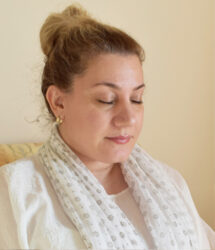Onward, Upward, Inward

When I was in fourth grade in the 1960s my parents gave me a volume that I still keep in my library, Living Biographies of Famous Women. My parents felt that my sister and I should be able to go to college, have a brilliant career, and rise to the top, just like Jane Addams, Susan B. Anthony, and Florence Nightingale, all featured in my book. And they wanted me to know that I could be as successful as any man in that pre-women’s liberation era, when few women had careers.
I think I took something away from reading their stories that was different from what my parents expected, though. I noticed that while these women were indisputably powerful and successful, many of them lacked one important thing: a satisfying personal life. Only one, Madame Curie, the famous scientist who did pioneering research on radioactivity, seemed to have a happy family life and a full career at the same time.
Somehow, I felt, there must be a way for women to find happiness in both spheres of life. A way to be successful without sacrificing family and friends. A way to make a living without burning out.
I’m not sure if this book became a factor in my search for a different approach to life, but I do know I decided early on to focus on personal development as the cornerstone of both fulfilling relationships and a successful career. At age 19 I learned the Transcendental Meditation technique and have spent time meditating twice daily every day to release stress and recharge creatively.
In fact, I count the time I’m meditating to be part of my “office hours,” because it helps me think more clearly and avoid the writer’s block that plagued me when I was younger. And of course, when you spend time tapping into that reservoir of inner happiness, it’s going to help every part of your life—including your family relationships.
This approach worked so well for me and many of my friends that I was happy to hear Arianna Huffington talking frankly about the need for women to recharge and rejuvenate in her 2013 commencement address to Smith College graduates.
“At the moment, our society’s notion of success is largely composed of two parts: money and power,” she said. “But it’s time for a third metric, beyond money and power—one founded on well-being, wisdom, our ability to wonder, and to give back.”
How refreshing—the idea that “well-being” and “wonder” and “giving back” would be part of a definition of success!
As Huffington points out, the current focus on money and power is not sustainable for anyone—men nor women. Stress is mounting, and “it’s only truly working for those who make pharmaceuticals for stress, diabetes, heart disease, sleeplessness and high blood pressure,” she said.
Huffington went on to note that women pay a higher price for stress than men—women in stressful jobs have a nearly 40 percent increased risk of heart disease, and a 60 percent greater risk for diabetes. And in the last 30 years, as women have made strides and gains in the workplace, self-reported levels of stress have gone up 18 percent.
In her speech Huffington humorously advised the Smith graduates to literally “sleep their way to the top,” citing research that shows how important sleep is to health and making good decisions. She noted that at the Huffington Post, they provide “nap” rooms where people can take time out to sleep or meditate to recharge during the day. She also advocated disconnecting regularly from the electronics that tend to run our lives.
She said, “What I’m saying is: learn to regularly disconnect from technology in order to connect with yourself. Learn to unplug in order to recharge. I’m convinced that we all have within us a centered place of wisdom, harmony, and strength.”
I think anyone who practices the Transcendental Meditation technique can identify with this experience—how great it feels to shut down the cell phone, shut the door, and take time to dive deep within the transcendent, the source of infinite creativity, happiness and bliss that resides quietly inside all of us.
After this speech, Huffington went on to sponsor an entire conference called The Third Metric of Success. As part of the programming, she interviewed George Stephanopoulos about his daily practice of the Transcendental Meditation technique.
“It’s been a lifesaver,” Stephanopoulos said. “I’ve been meditating for about two years now—consistently. I did it for reasons that we’re discussing here—to manage a frenetic life…
“I was always over-tired, over-stressed, feeling that kind of constant low-level impatience that is always ready to burst out, and I didn’t like it.”
Stephanopoulos said that part of the reason it’s now easier for him to get up at 2:30AM for work each day, is that he’s getting up to meditate. “It’s the equivalent of a couple hours more sleep,” he says. “And then in the middle of the day you get another boost. But beyond the practical benefits, I feel more space in my life, more of a cushion. “It’s easier to tap into that quiet when you have to make a decision—or in my case in breaking news situations, it’s easier to be calm, it’s easier to find that space.”
But back to the Smith College talk. Huffington encouraged the Smith graduates to find that place of well-being within. She said, “When we»re in that centered place of wisdom, harmony and strength, life is transformed from struggle to grace, and we are suddenly filled with trust, no matter the obstacles, challenges and disappointments. Because there is a purpose to our lives, even if it is sometimes hidden from us, and even if the biggest turning points and heartbreaks only make sense as we look back, not as we are experiencing them. So we might as well live life as if—as the poet Rumi put it—‘Everything is rigged in our favor.’”
I loved this, because it touches on an important point. When you feel less stressed, when you are living in harmony with yourself and nature, you gain something Maharishi, the founder of the Transcendental Meditation technique, calls “support of nature.” It’s a feeling of grace, of being in the right place at the right time. Of opportunities presenting themselves to you like candy on a plate, of being able to accomplish more than you thought possible.
As for myself, the key to that state has been my daily practice of TM. Like drawing an arrow back on the bow to its stillpoint in order to send it the farthest distance, the more I go inward in my daily mediations, the easier it becomes to accomplish my goals in life. To me, the key to going upward is going inward first. So it resonated with me when Huffingington ended her talk, “And now, Smith College class of 2013, onward, upward and inward!” And surely the modern woman, with multiple responsibilities in the home and in the workplace, needs this ability to dive within, to harness the support of nature to help her to effortlessly do less but accomplish more every day—a secret weapon to help live a full life at home and in the workplace too.
About the Author
Linda Egenes writes about green and healthy living and is the author of six books, including The Ramayana: A New Retelling of Valmiki’s Ancient Epic—Complete and Comprehensive, co-authored with Kumuda Reddy, M.D.
More Posts by Linda
- Tired and Burned Out? Transcendental Meditation Can Help: An Interview with Dr. Nancy Lonsdorf, MD
- Worried About the Future? Six Ways to Calm Your Anxiety
- What Do You Carry in Your Self-Care Tool Kit?
- Five Strategies for Family Caregivers
- From the Streets to College in Four Months: The Communiversity of South Africa Empowers Underserved Youth in Cape Town





